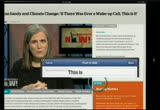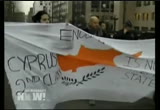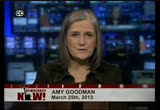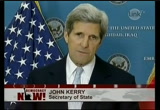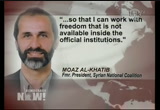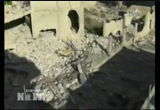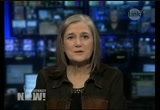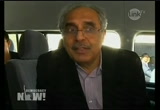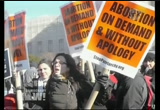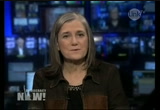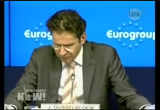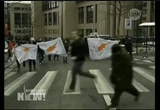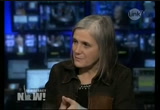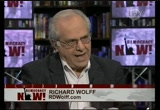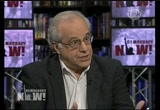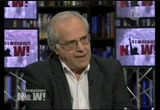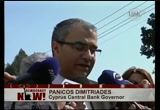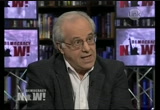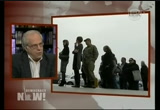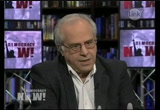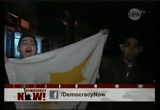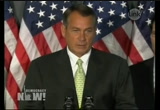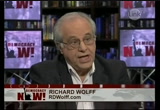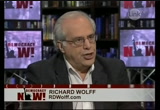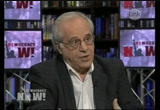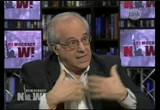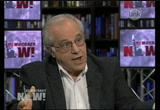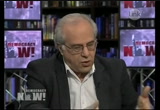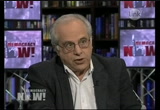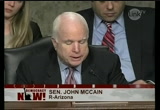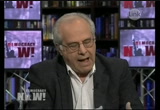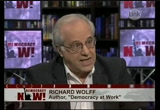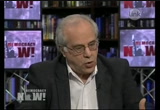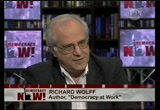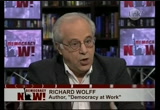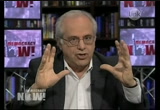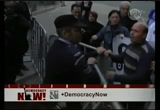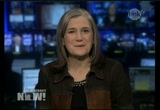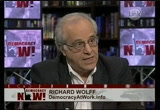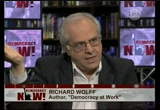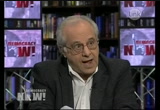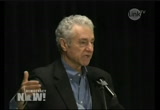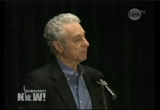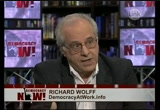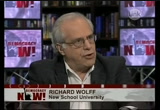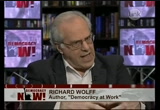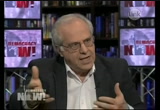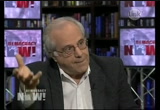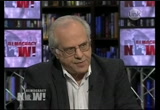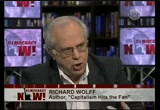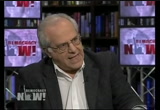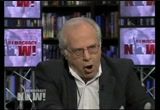tv Democracy Now LINKTV March 25, 2013 8:00am-9:00am PDT
8:00 am
03/25/13 03/25/13 [captioning made possible by democracy now!] >> from pacifica, this is "democracy now!" the solution is to find a solution outside from imf and stand on our own because it looks like our friends in europe are not supporting us at all. >> protests continue in cyprus against what critics describe as an economic world war iii, a bailout deal forcesyprus to freeze all accounts over $130,000.
8:01 am
there will limit prank withdrawals to about 1 1/3 dollars and closed its second largest bank this covers a harbinger of things to come in europe and even the united states? we will speak with economist richard wolff, author of, "democracy at work: a cure for capitalism." >> fundamentally, this is a struggle to take a crisis caused by the business community and make demands of people pay for it. that is what austerity means. the real test is whether the people will absorbent and accept it. >> all of that and more coming up. >> this is "democracy now!," democracynow.org, the war and peace report. i'm amy goodman. the government of cyprus has brokered a last-ditch $13 billion bailout deal with european officials to stave off the collapse of its banking sector. under the deal, on deposits above approximately $130,000 in
8:02 am
the island's main banks will be frozen and used to help pay off the banking sector's debts. in addition, cyprus' second- largest bank will be shut down. an earlier version collapsed last week when tsipras took to the streets to protest and a tax of up to 10% on their life savings. on sunday, fresh protests erupted. on cyprus withre the economist richard wolff after the headlines. and your report says the cia has been supporting a vast expansion in the flow of weapons to syrian rebels fighting president bashar al-assad. the new york times reports the airlift of arms and equipment to the rebels, largely overseen by turkey, has massively increased since early 2012 to include more than 160 flights in jordanian, saudi and qatari planes. u.s. intelligence officers have helped shop for weapons and have vetted rebel groups to decide who gets the arms.
8:03 am
the cia's covert backing comes despite the obama administration's public support for solely non-lethal aid to the rebels. meanwhile, the cia has further increased its role in syria by feeding intelligence to rebel fighters for use against the syrian government. the wall street journal reports the move comes as part of the u.s. effort to tamp down on islamist militants in syria by aiding secular forces. secretary of state john kerry has urged iraq to take action to stop iranian flights carrying arms to the al-assad regime to iraqi airspace. john kerry made the comments during a surprise visit to baghdad where he met with iraqi prime minister of maliki. >> i made it very clear that for those of us who are engaged in an effort to see president al- assad step down and to see a
8:04 am
democratic process take hold with the transitional government according to the geneva communicate, those of us engaged in that effort, anything that supports president al-assad is problematic. and i made it very clear to the prime minister that the overflights from iran are in fact helping to sustain president al-assad. and his regime. >> syriza's man opposition leader has announced his resignation in the latest sign of deep divisions among those fighting president a sad. moaz thank you said he was quitting as president of the syrian national coalition -- he had faced criticism from his own ranks for offering to negotiate with assad. and a further sign of turmoil among anti-government groups, the coalition's military chief has rejected the authority of
8:05 am
ghassan hitto, a u.s. citizen recently elected as interim prime minister over rebel-held areas. said hitto, a former technology manager formerly living in texas, lacks a broad base of support. the steering continue -- the syria conflict is continuing to spread beyond its borders. and sunday, israeli forces fired into syria and destroyed a military post in retaliation for gunfire from the syrian side. in the latest violence inside syria, explosions rocked the capital damascus this morning as rebels fired mortar rounds into a high-security area less than a mile from the home of president bashar al-assad. the forces it back with artillery fire. there were reports of least one person has been killed. israeli prime minister benjamin netanyahu has apologized to turkey for the killings of nine people on board the gaza-bound aid flotilla nearly three years ago.
8:06 am
on may 30, 2010, israeli commandos raided the mavi marmara in international waters, killing nine turkish activists, including one u.s. citizen. president obama brokered netanyahu's's apology for the attack, which the israeli leader made friday at the very end of obama's first presidential visit to israel. in a phone call to the turkish prime minister, that tianeman apologize for "any errors that could have led to the loss of life." erdogan said the apology was one step toward normalizing relations between israel and turkey. is rumored nine of our citizens in international waters -- israel murdered nine of our citizens in international waters, they even tried to use negotiators to repair the relations between told them there would be no normalization of relations unless they
8:07 am
apologized, paid compensation, and lifted the embargo on palestine. the parties mocked the government for believing [indiscernible] the phone call was a step forward. >> israel did not agree to turkey's call to in the blockade of gaza. roughly adapter president obama left israel, israeli police raided a palestinian protest camp on the outskirts of jerusalem. protesters had erected the camp last wednesday within the e1 settlement zone, which bisects the west bank and cuts palestinians off from their land more than 200 israeli officers leveled the camp before dawn on sunday. a palestinian lawmaker said he and four others were arrested. an earlier encampment on the same site was dismantled by israeli forces in january. the united states has announced it will transfer control of bagram prison to the afghan government today, the key details on the deal have not been disclosed. the u.s. was seeking to retain
8:08 am
veto power over whom could be released from the prison, which human rights groups have dubbed the other guantanamo. in addition, the u.s. wanted assurances that certain prisoners would not be released even if they could not be prosecuted in court. in a central african republic, a rebel leader has declared suppressant a day after president bozizé fled the country as rebels stormed the capital. the rebels had accused bozizé of reneging on a general peace deal. the newly installed president djotodia has vowed to re here to that accord by sharing power with civilians and loyalists of the former regime. south africa says 13 of its soldiers were killed in clashes with the rebels on the outskirts of the capital bahgui. anti muslim violence continued to spread in burma over the weekend after days of clashes left dozens of people dead. s ein dispatched the army to quash
8:09 am
violence in the central city of meikhtila, where at least 32 people were killed and roughly 10,000 were displaced by armed buddhists. mobs continued to destroy mosques and burn homes in at least three other towns. the united nations' top envoy to burma toured the city on sunday. they are feeling very insecure because their houses have been destroyed, they say all of the mosques have been destroyed in this locality, but they are been provided with food and health care and they don't have any complaints about the basic necessities. they are worried and i have tried to stress to them that this should be seen as criminal action and it should not be converted into a major communal problem and the communities must
8:10 am
learn to live together. >> the new york times is reporting about 300 immigrants are being held in solitary confinement at u.s. detention centers on any given day even though they are being held on civil, not criminal, charges. the times reports daily half are isolated for 15 days or more, the point to which psychiatric experts say they are at risk for severe mental harm. one mexican immigrant says he was held in solitary for four months. he told the times he sank into a deep depression as he overheard three other immigrant detainees attempt suicide. north dakota has passed a measure that will let voters decide whether to end abortion in the state. the measure puts to a ballot vote a possible constitutional amendment saying life begins at conception. north dakota state legislators also passed another bill imperiling abortion access by requiring doctors at the state's only remaining abortion clinic to obtain hospital admitting privileges. north dakota lawmakers have
8:11 am
already passed what would be the strictest abortion ban in the country, ending abortion when an embryonic heartbeat is detected, which can happen at six weeks of pregnancy or even earlier. two teenagers have been arrested in brunswick, georgia following the shooting death of a 13- month-old baby. the baby's mother, sherry west, said a young man approached her and demanded money. when she said she didn't have any, he shot her and then shot the baby in the face. the suspects are 17 and 14 years old. new york mayor michael bloomberg has announced he will bankroll a 12 main dollar tv ad campaign aimed at convincing us senators to back gun control. the ads will focus on legislation mandating universal background checks. national rifle association chief wayne lapierre has vowed to lead a counter campaign against bloomberg's efforts to. in his weekly address on saturday, president obama called
8:12 am
on lawmakers to pass gun control legislation, including a contentious assault weapons ban that has been dropped by senate democrats. >> these ideas should not be controversial. they are common-sense. they are supported by a majority of the american people. i urge the senate and house to give each of them a vote. as i have said before, we may not be able to prevent every act of violence in this country, but together we have an obligation to try. we have an obligation to do what we can. >> the police chief of omaha, nebraska is promising an investigation after video captured police throwing them into the street even though he did not appear to be resisting. on the recording, officers then appear to punch octavious johnson repeatedly while he is on the ground. johnson and his two brothers were arrested during the incident last week. their aunt said officers chased one of them into the house to try to seize the video
8:13 am
documenting the apparent assault. three officers had been reassigned while the probe is under way. anate democrats have passed three. -- $3.7 trillion budget for next year that protects social programs house republicans are seeking to gut. the plan approved early on saturday is the first budget to pass the senate in four years. all republicans and four democrats voted against it. last treat the senate rejected a budget authored by congressmember paul ryan that would have cut programs such as medicaid and food stamps. the nigerian literary icon chinua achebe has died and at the age of 82. his novels, including the highly celebrated "things fall apart," provided a counterpoint to the colonial depiction of africa and helped give voice to a continent. in 2008 during a celebration of his birthday at the library of congress, chinua achebe was asked how the groundbreaking novel, published in 1958, had
8:14 am
changed him. writinge process of "things fall apart, >> what it changed my life. because i had to invent the language of that story. something that anybody was teaching anywhere. the conversation between evo and english. make it up as i went along. >> chinua achebe died in boston after a brief illness. and those are some of the headlines. this is "democracy now!," democracynow.org, the war and peace report. i'm amy goodman. of the financial world are on the small mediterranean island of cyprus today. the government of cyprus has brokered a last-ditch $13
8:15 am
billion bailout deal with european officials to stave off the collapse of its banking sector. under the deal, all bank deposits above approximately $130,000 will be frozen and used to help pay off the banking sector's debts. this will result in a specially heavy losses for foreign depositors at the mediterranean island's banks, many of which are russian. in addition, cyprus's second largest bank will be shut down. protesters have described the deal as an economic world war iii. some say cyprus is a harbinger of things to come in europe and possibly even the united states. cyprus' president described the deal as a painful one, but the eurogroup chair praised the deal. >> the program will be based on ambitious measures in areas of fiscal consolidation, structural reforms, and privatization. the authorities will also take
8:16 am
decisive action to safeguard the stability of financial sector including bank resolution and the restructuring measures concerning the two largest banks. a levy on deposits across the whole banking sector can and will therefore be avoided. >> an earlier version of the deal collapsed last week when it separates to to the streets to protest paying a tax of up to 10% on the life savings. the package called on cyprus to impose a onetime tax on bank deposits as a condition for $13 billion in rescue money. the plan led to mass demonstrations as well as panicked bank withdrawals as cypriots rushed to protect their savings. on sunday, the island's central bank imposed a 100 euros per day withdrawal limit on bank accounts, which led to a fresh round of protests. >> if we can take 100 euros today with what the eurogroup has decided for the cyprus
8:17 am
nation, we will not have nothing in the coming months and years. that will be the same for many years. the only solution is to find a solution outside from the imf and stand on aid on our own because it looks like our friends in europe are not supporting us at all. >> for more we're joined now by richard wolff, a professor of economics -- emeritus professor of economics at university of massachusetts, and hurst and hosts a weekly program called economic update every saturday at noon. his father of several books, most recently, "democracy at work: a cure for capitalism." welcome back to "democracy now!" why is cyprus of significant? >> cypress is significant for several reasons. first, it marks an escalation in what we call austerity economics.
8:18 am
it is an effort to pay for the cost of this now 6-year-old anbal crisis in a new way, effort to fund the bailouts of banks in a new way. and the new way was agreed last week by the european forces that control this, the central bank, the european union, and the imf. and to impose on cyprus this new step, which is literally to go into the bank accounts of the citizens of cyprus, roughly 1 million people and a small island in the middle of the mediterranean, and snatched money out of their accounts. unlike other austerity or you levy a tax and cut social programs like we're doing here in the u.s., that money dribbles in over a year or longer. this way the government can get the money to bail out the banks quickly and cleanly and neatly. friday night, the people of tsipras went to bed with a certain amount of money and their accounts they thought, and monday morning they were
8:19 am
supposed to a break with x% less money because the government had taken it. it's a just this crisis is far from over and the authorities are desperate to find the money of the then by taxing corporations, other than taxing the wealthy in order to solve their problems. the second reason it is important, the people of cyprus woke up, took one look this and said -- no. they did it dramatically, and in a matter of hours, they and did everything the european governments and their own government had agreed to a few nights earlier. it is a demonstration of people power in this little corner of the world that is very impressive, and i think the basis for some optimism about opposition. >> how did they say no? >> basically, by saying we're not going to consume, we're not going to go to work, we're going
8:20 am
to call on our fellow citizens across europe to recognize if they can come into our bank account and take our money, then what is going happen places like italy, spain, portugal, britain where very similar situations are plan themselves out? this call for solidarity around this issue terrified all of the other governments of europe. suddenly, the firmly committed deal unraveled in the face of popular resentment and opposition. >> how did cyprus get to this point? >> it is a small country. its economy is based on three things. tourism, a very pleasant place for people to go. shipping, as befits an island. above all, what is euphemistically called finance. in the 1990's and early in this century, what the banks in cyprus did was offer themselves around the world as a wonderful place to come and make a deposit. we will convert whatever
8:21 am
currency you have into euros, which is a very good currency to have. we will pay you an unusually high interest rate and ask no questions. this is often called good banking. they got a lot of deposits. depending on the estimates you believe, the total deposits in the bank of cyprus or five to eight times larger than the total gdp of that economy, which is an absurd situation. and those banks in cyprus took all of those deposits and they did what banks are supposed to do, find prudent, safe, non- risky investments. like all the banks and the last 20 years, they failed. they found that investments. they did not to prudently. the banks fell apart. the whole cyprus economy, already impacted by this crisis with less tourism and shipping, now sought its banks defunct --
8:22 am
basically, bankrupt. they appealed for a bailout, which is now standard in europe. >> despite widespread opposition to the deal by the residents of cyprus, cyprus's parliament will not need to approve today's deal with international lenders because the parliament has the necessary legislation to implement the bailout last week. on friday, the governor of the cyprus central bank warned political leaders that the country would face a disorderly bankruptcy unless they approved the bailout. >> all of the elements the central bank of cyprus contributed must be voted for immediately and as they are. two basic reasons for it first, saw a positive message is sent abroad which will help agreement soon with the troika. secondly, absolutely necessary the central bank of cyprus has the right legal tools to allow -- handle the crisis.
8:23 am
>> richard wolff, can you respond? >> this is blackmail. this is basically the officials of the banks and political leaders going to be mass of people and saying to them, "this awful deal that makes you who have nothing to do the crisis and did not get any bailout pay the cost of the crisis and the bailout. you must do this because if you don't, we will do even more damage to you and your economy, so give us your deposits, give us your money, pay more taxes, suffer fewer social programs because if you don't, we will impose even worse on the." it is the basic idea of austerity across the board and in our country, too. i think it is the confrontation of a system that does not work with the mass of the people saying, we will go down and take you with us unless you bail us out. >> explain whose money it is. >> it is amazing. the way this works, the plan,
8:24 am
which is still on the board, is to go into the accounts of depositors -- remember, a depositor puts his or her money with our individual or a business, into the bank under the notion is guaranteed, insured, and safe. it takes these people's money, thereby destroying all confidence and feelings of insurance or security, and the government will take that money and the government will then, in the language of these politicians, recapitalize our banks and restructure them. translated into simple english, there quantitate the depositor'' money and bail out the banks. -- they are going to take the depositors' money and out the banks. it goes into the account of the bank itself. it is the banks through the government stealing from their own depositors. it is stunning as an economist to watch it. it is the opposite of a bank guaranteeing your deposit. it is the bank looting your
8:25 am
deposit. it is an extraordinary study in how extreme this crisis is that there would have to go to such an extent and risk the blowback you are already seeing in cyprus and building in other countries as they confront similar measures. >> and the significance of the second largest bank being closed? >> that is an attempt to say private banking. they will move much of the closed bank into the other non- closed bank and have the government absorb the losses that are not transferred so that you can say a private banking by reducing three or four large banks to one fewer by taking the one in the worst condition and basically bailing out for its mistakes and putting what is label into it in the other private banks. it is a refusal to confront the private banking, not just in greece and cyprus but across the world, has driven us into a catastrophe of global proportions and we're doing
8:26 am
everything in our governments to fix the situation without imposing on them, without questioning their field performance. it is an amazing study in how to solve the problem by refusing to confront its cause. >> we're talking to professor richard wolff, a professor emeritus. he has written a number of books. his latest is, "democracy at work: a cure for capitalism." we will go from cyprus to the economy in europe and the economy right here in the united states, and what exactly does he mean a cure for capitalism? wstay with us. ♪ [music break]
8:27 am
8:28 am
collaborator with the great alongsingers of his era with americans such as nat king cole. he was considered a giant in the golden age of cuban music. this is "democracy now!," democracynow.org, the war and peace report. i'm amy goodman. wolff, a is richard professor emeritus at the university of massachusetts and hearst, now new school university, author of many books including, "democracy at work: a cure for capitalism." i want to talk about austerity here at home read this is house speaker john boehner speaking last month that in the $85 billion budget sequester cuts that took effect march 1. >> the american people know the president gets more money, they're just going to spend. he has got his tax hikes. it is time to focus on the real problem in washington, and that is spending. >> house speaker john boehner. professor, your response?
8:29 am
also, the obama administration was warning catastrophe is sequestration took place. it took place. >> it is a stunning comment on our dysfunctional government built on top of a dysfunctional economy. here we are in the middle of a crisis. we have millions of people without work. millions of people are losing their homes. we have an economy that does not work for the vast majority. the u.s. government is one of the major customers for goods and services in america. sequestration is simply a cutback in government spending. it does not take rocket science to understand that if the government of the largest single buyer of goods and services cuts back on the goods and services it buys, that means companies across america will sell less and they will have less need of workers and it will lay off workers. so this is in fact that worsens and employment is already severe. if you put that together with the tax increase on january 1 --
8:30 am
let me say a word about that. we heard a lot of public debate about taxing rich people and not taxing rich people, republicans and democrats, but the tax on the wealthy is small compared to the tax on the middle and lower incomes that went up january 1. when we raise the payroll tax from 4.2% to 6%, we raised over $125 billion, much more that was raised by taxing the rich, and we savaged the middle and lower income groups in america, those that in the presidential election both candidates had sworn to save and support. we attack them, thereby limiting their capacity to buy goods and services. you put together the taxing of the middle and lower incomes with the cutbacks of government spending, and you are going to do it every european country that has imposed austerity has already discovered -- you are making the problem worse. with all the homilies mr.
8:31 am
boehner can put out about how spending is a problem, this abstract idea does not change the fact you are making the economic conditions of the mass of people worse by these austerity steps, not better. and that could be put as the fire burning at the feet of politicians so they stop talking these obstructions and deal with the reality of what they're doing. >> what do you think needs to be done? >> a radical change in the policies. i think it has to go far beyond simply reversing his austerity program. just recorded history, back in the 1930's, the last time we had a breakdown of our capitalist system, we did not have austerity or cutbacks. we had the opposite. sociallt created the security system. he went to everyone over 65 and said, "i am going to give you a check for the rest of your life." he created the unemployment system. he created the public employment
8:32 am
program and hired billions of workers. it is the opposite of austerity. any politician who says we must do this because there's not option has forgotten american history of not that long ago. the first thing i would do is go in that direction. i want to go further because i think our problem is deeper. this crisis was not supposed to happen. when it happens, it was not supposed to last a long time. all of that has been proven false. the problems run deep. i think what we have to do and what the book tries to do is talk about reorganizing our economy so for the first time we can say, we're not only going to get out of this crisis but take the steps that can prevent us from having them over and over again as our unstable business cycle ridden economy keeps imposing on us. for me, it is the more profound change that we finally have to face, painful as it is, after 50 years of a country unwilling to face these questions, i think
8:33 am
any basic change. that is what i spend most of my time stressing. could obama do without congressional support right now? >> i think in many ways he could initiate a public employment program. i think it is long overdue that he find all the ways available to him to say what roosevelt said. not that roosevelt did everything correctly and that he is a genius or any of that, but to take some lessons from those people in our country before we took steps that were successful. >> roosevelt did not plan on doing this when he first took office. >> absolutely. he had pressure from below. afl-cio. >> right. organizelist parties
8:34 am
millions of americans into unions who had never joined a union before. they push from below and a very powerful way. they changed mr. roosevelt, showing politicians is subject to pressure from below can change, sam lessig of cyprus has taught us yet again. my response is, learn from that. roosevelt went on to the radio and the merit -- when on the radio and said, it the private sector cannot or will not provide work for the millions of americans that need and want to work, then it is my job as president to do it and he did. i think mr. obama could and should overcome whatever has made him hesitate. we in this country not only don't have a federal employment program, republicans and democrats have not even put it on the floor to debate it as an important issue, even though it comes out of our own history. i say put our people to work. they want to work. the federal reserve says 20% of our factory and office space is
8:35 am
sitting unused. we have people who want to work, the tools, equipment, and raw materials for them to work with. lord knows we need the wealth that they could produce. put them to work and make it a national issue. >> where does the money come from? >> roosevelt went to the wealthy and corporations and said to them, "you must give me the money to take care of the massive people because if you don't, we're going to have a catastrophe in this country. we're going to have a social revolution." my argument is, let's go back to the same tax rates that roosevelt imposed, or at least in that neighborhood, which is much higher on wealthy people and much higher on corporations than we have today. that is what he did. in case our politicians are worried, let's remind them. mr. roosevelt, who took those daring steps, was reelected to the president four consecutive times. the most popular president in american history. it is not a dead and political
8:36 am
decision. it is the best decision a president -- it is not a dead in political decision, but the best decision the president could make. >> we're talking to richard democracy atr of, " work." before we talk about democracy at work, i want to go to a recent hearing in washington. executives with the banking giant jpmorgan chase appeared before a senate panel earlier this month to answer questions around so-called london will trades, the cost the bank more than $6 billion in the real financial markets worldwide. this is arizona republican senator john mccain criticizing jpmorgan's actions. >> jpmorgan completely disregarded risk limits and stonewalled federal regulators. it is unsettling that a group of traders made reckless decisions with federally insured money and that all of this was done with
8:37 am
full awareness of top officials at jpmorgan. this bank appears to of entertained and embraced the idea that it was "too big to fail." >> jpmorgan's id from chief risk officer testified at the same hearing. >> i don't think it is too big to fail. i think there are further work that needs to be done to demonstrate and document as an id is in process. i'm not leaving that process or deeply involved in it, but i think it is something that needs to be demonstrated to everyone's satisfaction. >> that was ashley bacon, jpmorgan's interim chief risk officer. can you explain what took place? >> on the question of too big to fail, there really is not much to say. in 2008, our banks failed -- all of them. the with the cyprus banks failed and for similar reasons. they took in a lot of depositors' money and made risky bets they should not have made,
8:38 am
and they failed and so they did not have the money to honor their obligations. they turn to the government for a bailout. when the government hesitated because it is public money to bail out a probably failed bank, they were told in another kind of blackmail, we're too big to fail. if you don't bail us out, we will collapse and take the entire economy with us. that was a persuasive argument, particularly after the bailout lehman brothers to fail and that nearly did take the economy with it. that was a convincing argument did you would have thought they learned a lesson about the problem of a too big to fail financial institution. if you thought that, you would have been wrong. the same banks that were too big to fail in 2008 are all of them bigger today. so we did not learn the lesson. we did not break up the banks. we did not limit, control their growth. they are bigger now than they were then. in a sense, maybe shame on them
8:39 am
the first time, but having allowed this to happen, it is a shame on us. number two, we seem to need as a nation to believe that we have the power to control, limit, or regulate whether it is the glass-steagall act the came out of our disaster of the 1930's or the dodd-frank act, the came out of the disaster that started in 2008. we seem to want to believe we can leave in place private banks now matter how big they are and hedged about with regulations. the proof of the will trades in london, the proof of everything we know is that these banks have the money, the staff, the resources to work their way around the regulations at least as fast as we oppose the on them. that is what these hearings finally show. they can make trades that are too risky, looze while the amounts of money, turn to the government and demand they be billed out each time and they
8:40 am
get it. we're telling them in a classic example, look, to whatever you want. you don't have any risk of fundamental failure and punishment for regulation does not work. because we believe in place an entity, a large corporation with the money and the incentives to get around it. >> jamie dimon, the head of j.p. morgan chase, did not testify. he was brought before the senate last june where the senators were asking him for advice. when you look at the senator's on the senate committee and how much money jpmorgan chase had given each of them, we're talking about millions of dollars went to many of them. >> i say the big corporations of the banks have the resources and incentives and being polite, yet part of the resources are going into literally making sure the political regulator is a good friend and understands the
8:41 am
complexities. in simple english, they are buying their way into the situation we watch, which is we will pretend to be regretful, you will pretend to be protecting the public and make regulations that we help you write so that we can get around them. it is something that ought not to be allowed to continue because we're living the economic crisis that comes from that way of doing business. >> what lessons have been learned since 2008 and today could the u.s. see the same situation as cyprus? >> absolutely. we have banks that are literally telling us because we know from our controls that they are trying even to regenerate it. they are trying to get people to borrow more money again. we're not changing the way -- wage structure of america, which these people required to go into debt to supplement their wages. the irony is, we are trying to
8:42 am
kickstart our economy, to get it going again. but the problem is, our economy was a train headed into a stone wall in the first years of this century. if we get our economy going again without fundamental changes, what we're doing is putting the same train back on the track headed toward the same wall. cyprus shows us what is happening. we don't have to take a small countries. take great britain, are classic ally. their economy is in the second or even in some people's minds, the third recession within the crisis since 2007. they are falling in austerity problem or process exactly like that supported by mr. boehner and the economic downturn in great britain is catastrophic for that society. so we have this image of a future for as if we don't make fundamental change, but everyone wants to put it away and pretend that we can let it go by itself or a few regulations will
8:43 am
solve the problem. they have not, they are not in and out elsewhere, it is not a strategy we should pursue in this country. >> when we come back, we will talk to professor richard wolff about the alternatives, about what he has put forward, "democracy at work: a cure for capitalism." ♪ [music break]
8:44 am
was an afro-cuban piano player, one of cuba's finest musicians of all times but he died friday at the age of 94. this is "democracy now!," democracynow.org, the war and peace report. i'm amy goodman. we continue with richard wolff does a weekly program on wbai in your call it economic update every saturday at noon read his
8:45 am
latest book is "democracy at work: a cure for capitalism." bywhat exactly do you mean this? >> what i mean is a change in the enterprises that produce the goods and services we all depend on and provide the jobs we all need and want. i think those have to be in a final way the -- fundamental way democratize. saysgithe and the country that it sent to most of horton fight is democracy. if you believe that, and i am a fervent supporter of democracy, and obviously you are, you and your program that way, but we ought to have democracy in the place where we as adults and most of our time. five out of seven days we go to work. we go to a place where we use our brains and muscles eight or more hours, five out of seven days. if democracy is an important value, it ought to be right there first and foremost for it but we don't we basically have a situation where most of
8:46 am
us go to work in a place where the decisions made are made by tiny group of people, the major shareholder suit on the block of shares in our system who select a board of directors, 15 to 20 people, and then make the basic decisions. what to produce, how to produce them, where to produce and what to do with the products. the rest of us must live with the results of that decision. so if that tiny group of people make a decision to close the factory in cincinnati or the office in atlanta and move to shanghai, the chips fall where they may. if they decide to use a toxic technology that is not good for air and water bucket for the profits, they do and we live with the results. when they decided take the profits of their business and give enormous pay packages to a handful of top executives a big dividend payouts to shareholders, which of course they do since they are in a position to do it, and the rest of us have to take out absurd debts to get our kids through
8:47 am
college, that is the inequality of wealth and income we have in america. i look at the decision making apparatus and say, why were we surprised they make the decisions the way they do? we all live with the results and we have no say in how those decisions are made. it is not democratic. that is the first thing. the second thing, we're in five years now of economic crisis that indicate that when organizing the decisions does not work for the massive people. it works for them. the stock market is back, profits of big corporations are back -- surprise, surprise -- but we are left britain for me, the solution is, let's face this. let's build a real choice for americans between working in a nondemocratic top-down organized capitalist enterprise or, for like a better term we can call cooperative spirit workplaces that are organized
8:48 am
democratically. i think we will have less inequality of income, less pollution of our informant, and less loss of jobs out of the country if those decisions were made by the people, as they should have been from the beginning, he will not make the kinds of this immensdecisions ts into the economic mess we're in now. >> you wrote a piece in june called "yes, there is an alternative to capitalism." at the green party's convention last year, the keynote speaker said the model is been replicated in the u.s. spread of one to turn to a clip of white gar alperovitz said. >> an ohio, lots of people understand the idea. in cleveland, building on the mantra model and other ideas,
8:49 am
there are a series of worker owned integrated co-ops in cleveland. and neighborhood where the average income is $18,000 per family. they have got these co-ops not to standing alone, but living together, nonprofit corporation and a revolving fund. the idea is to build a community and worker ownership, not just make a couple of workers richer, but to build a whole community and use the purchasing power of hospitals and universities. [indiscernible] they use about one-third of the heat and water and electricity. they're on track now to put in .ore solar capacity >> that was gar congress talking
8:50 am
about the mondragon , pierre. we interviewed one of the cooperative members and we will have a link to that line democracynow.org. richard wolff, talk about that model and what is happening here. >> it is interesting because it is not just a rogue cop for the decisions are made of how, where, what to do with the profits are made by the people, just to mention one of their achievements, they have a rule that the highest paid worker cannot get more than a maximum of eight times the lowest rate in our society, typical in our large corporations, the ceo gets 300 to 400 times with the lowest worker gets. for those of us interested more on the less equal society than what we have in the u.s., if you corporatize your enterprise, that is a sure route to get there and we of not found any other route just as effective. the importance of mondragon is a
8:51 am
start in the middle of the 1950's with a catholic priest with six workers in the north of spain, desperately trying to overcome the unemployment. here we are over half a century later having to compete with countless capitalist enterprises. they won the competition. that a growth record that would be the envy of any couples corporation. they went from six workers in 1956 to 120,000 workers today in spain. >> and they are making? >> everything. dishwashers, clothing -- clothes washers, raise rabbits on farm, high-tech research with general motors and microsoft as some of their partners, they really have a family of 200 to 300 co-ops united within the mondragon corporation. they have shown the ability to grow and adapt and shown their competitive power.
8:52 am
they have shown all of the different ways a corporation can develop without a top down hierarchal and democratic structure. we do not have to choose between effectiveness, growth, job, security, and nicaragua to a structure. the corporate jet structure can be a way to get there. in the u.s., we have a lot of such co-op's developing. there's one in the bay area of california, six bakeries and coffee shops that were set up on that model. they started with one and now six. they have grown all over the u.s. there are these efforts, often done by people who want a different kind of life. they want to be in charge of their own job. they want have a sense of control and a sense that they're not just a drone doing the work, but part of the folks who design and direct. it brings out new capacities.
8:53 am
it makes you more papago the work. it is a more satisfying job life than you would otherwise have. example, we can learn something from a country called italy the we admired for its cuisine and lovely countryside. they have a law there passed in 1985 after the name of the legislator. it offers a choice to unemployed workers. you can take a goal every week, an unemployment check the way we do in this country, or you have an option if you get at least nine other workers to make -- the unemployed workers like yourself to meet the following choice, you can get as a lump sum it can get your entire unemployment program of two years of checks in your hands right to the beginning -- you have to have nine other workers or more -- and have to use that money as the startup capital for
8:54 am
a cooperative enterprise. the idea of the italian government was, if we give workers this to set up a job and enterprise, they will be much more committed to it than they would if they did not have that. >> how do they know they will do it? >> they don't. but they know the workers have an incentive. if they don't make that work, they cannot go back and collect unemployment the government does not spend much more than it would anyway, but it creates jobs and creates workers committed because it is their enterprise, to make that work as their personal solution and as a way not only for them to survive, but for the whole of the italian society for the first time to see what it is like to have an enterprise where you run the affair. in america, we want to believe in freedom of choice. let's give people that. they can have the choice to go work in a top-down tactless enterprise, what we're used to, but if we develop the alternative, a program of co-ops around the country, then americans could say, what would
8:55 am
be like to work their? let's see what that is light. we would have the choice that we do not have this country now. >> i want to turn back to the crisis in cyprus and related to what is happening here. bill o'reilly of fox news warned his audience last week that cyprus and other european countries are facing economic hardships because they're so- called nanny states. nowreeze italy, spain, cypress all broke. other european nations are close. why? they are nanny states and there are not enough workers to support all of the entitlements these progressive paradises are handing out. >> that was bill o'reilly. >> he gets away with saying things which no other undergraduate in the united states with a responsible economic professor could ever get away with. if you want to refer to things as a nanny states, the place to go in europe is not to southern tiers. the place you toward germany and
8:56 am
scandinavia because they provide more social services to their people than anybody else. guess what? not only are they not in trouble economically, they are the winners of the current situation read the unemployment rate in germany is below 5%. ours is pushing between 7% to 8%. please, get your facts right, mr. o'reilly. the nanny state you call it, the program of countries like germany and scandinavia who tax the people heavily, by all means, but provide them with social services that would be the envy of the united states. a national health program that takes care of you whether you are employed or not in its proper health care. in france, the losses when you go to work to get five weeks' paid vacation. that is out an option, that is the law. you get support when you are a new pair for your child care and so forth. they provide services. they are successful in germany and scandinavia, much more than
8:57 am
we are in the united states and much more than those countries in the south. they are not broken the south because their nanny states, since the many states are doing better than everyone. the actual true that mr. o'reilly is the opposite of what he says. the more you do nanny states, the better off you are during a crisis and to minimize the cost of the crisis. that is with european economic situation actually teaches. he is just making it up as he goes along to conform to rent a theological position that is harder and harder for folks like him to sustain so he has to reach further and further. >> other actors for capitalism? >> i think there is a set of fundamental reorganizations. when you have a private banking system in the u.s., the way we did up until the 1970's and 1980's, you had it in a position relative to the economy that made a certain sense.
8:58 am
but over the last 30 or 40 years, for many reasons, we have made that the central part of the economy. today it is not unusual for a person who goes into a grocery store to get a bottle of water to use a credit card, basically to make a loan in order to buy that all of water. everything that consumers do is now mediated by debt. everything corporations do and as with around the world, the governments are in debt. it is everywhere. it has become the water we swim in and the air we breathe. that puts the banks in an unbelievably powerful position because they are the repository of the means to borrow. if we're going to make an economy dependent on debt, we cannot leave the power to control that in the private hands of banks. either we don't become a debt ridden country or we may borrowing and lending a social program. we cannot allow private banking. it does not work. it needs to be changed. >> richard wolff, thank you for
8:59 am
92 Views
Uploaded by TV Archive on

 Live Music Archive
Live Music Archive Librivox Free Audio
Librivox Free Audio Metropolitan Museum
Metropolitan Museum Cleveland Museum of Art
Cleveland Museum of Art Internet Arcade
Internet Arcade Console Living Room
Console Living Room Open Library
Open Library American Libraries
American Libraries TV News
TV News Understanding 9/11
Understanding 9/11